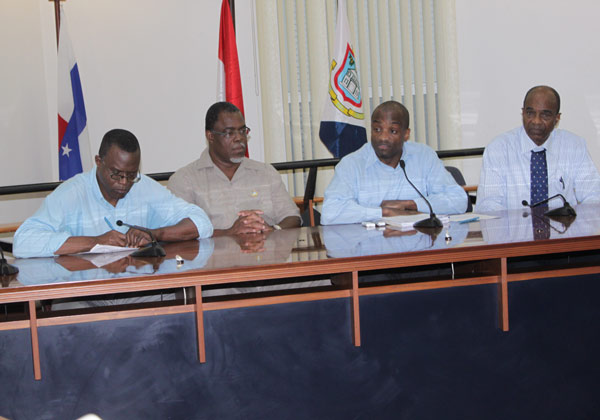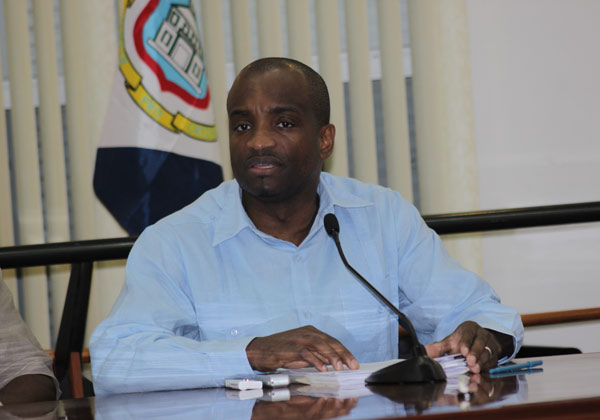 Philipsburg: --- Commissioner of finance Xavier Blackman in reaction to several media reports on the 2010 budget said the information given to the media was emotional and misleading. The commissioner said he believes the aim was to cause fear and deception to the public and taxpayers both of which are irresponsible and unfortunate. He said for as for him the information was politically tainted and does not represent the facts regarding the CFT and the budget of 2010.
Philipsburg: --- Commissioner of finance Xavier Blackman in reaction to several media reports on the 2010 budget said the information given to the media was emotional and misleading. The commissioner said he believes the aim was to cause fear and deception to the public and taxpayers both of which are irresponsible and unfortunate. He said for as for him the information was politically tainted and does not represent the facts regarding the CFT and the budget of 2010.Blackman used several quotes that were printed in the media such as arrogant, slap in the face that was used in several media articles all of which he said he intended to clarify at his press conference held early Sunday morning.
The commissioner made clear that he is a non-politician and he was hired to do a job as a professional based on technical and legal specifications. He said he has been approaching his duties based on the exact guidelines, rule, and regulations. The commissioner also indicated that the executive council has also approached the process of budget in the same exact manner.
Blackman said in July 2009 the CFT advised the central government to include the financial consequences of the dismantling in the budget for 2010. He said the central government chose not to follow the advice of the CFT and they approved the budget of the central government in November 2009 without any provisions for the dismantling of the Netherlands Antilles. Blackman said interestingly enough this was done a few weeks before the law was handled and passed on December 29 2009 on the transfer of tasks for St. Maarten and Curacao.
The finance commissioner said the island government of St. Maarten has been making several calculations while preparing the 2010 budget based on the same advice given to the central government by the CFT that is include the elements on the dismantling in the budget.
The commissioner said he said repeatedly that if St Maarten takes into account the dismantling and if the island should receive its rightful share along with the locally generated income then St. Maarten could have a balanced budget and have a small surplus in 2010 without implementing any new taxes, which would further burden the people of the island. Blackman said he also indicated on a number of occasions that safeguarding the island's income and assets should be a top priority for St. Maarten as it moves towards country status.
He said should St. Maarten take the advice and suggestions made by the CFT then the island government would have raise taxes, or, as St. Maarten prefers, balance the budget without putting additional tax burdens on the people and businesses of St. Maarten. Instead, the executive council proposed to use revenue due from the Central Government, which is due this year when St. Maarten starts taking over Central Government tasks, instead of burdening the population and businesses with new or additional taxes in these tough economic times.
Blackman said up until January 2010 the CFT secretary had been working closely with St. Maarten's financial advisers in fine-tuning the amount of income and expenses that are reflected in the draft budget, which also reflects the transfer of tasks in the dismantling of the Netherlands Antilles. The commissioner said during the deliberations St. Maarten's advisers and government was even praised by the CFT for being ahead with the visions on the transfer of tasks to the island territory. He said the CFT was even pleased to see the island was beginning to think what it would mean when the island takes over the tasks in 2010. Blackman said on February 8 2010 the CFT then suggested that if St. Maarten removes all the projected income and expenses related to the transfer of tasks from its 2010 budget and to plug the deficit that this would create with new and additional taxes. He said the main argument of the CFT regarding their request was that the central government budget had already been approved without taking the transfers of tasks into account. He said the CFT also indicated that there is no formal agreement other than the law that was passed on December 29 2009, which states that the transfer of tasks and income will begin as of 2010.
Blackman said he already indicated to the CFT that St. Maarten and Curacao has a formal agreement regarding the transfer of a number tasks dated March 12 2010 which would take effect as of March and April 2010. He said all along St. Maarten's arguments are correct which is now backed by history, which shows that St. Maarten is taking the right approach.
Apart from those two main arguments, Blackman said the CFT also had some technical requests, which they want the island government to address prior to them giving their blessings to the budget. Blackman said the technical requests are caused by the lack of financial management in the past. He said there were a number of items that could not and still cannot be provided because they were never provided when making budgets in the previous years. Blackman said it is not that St. Maarten does not want to provide that information but the information is not available to the current government.
The commissioner said they are currently working on the information based on the CFT's recommendation. Blackman said St. Maarten's island government has reacted to the CFT's letter where they clearly indicated the island's position, which is also based on the law on budgeting where all income and expenses must be projected in the budget. The commissioner said the island government did not make this law instead its common practice in the accounting world which is also laid down in the same laws that regulates the CFT and other entities involved in the process.
The commissioner gave an example where he said the Dutch government has been planning and budgeting a 3.2 million Euros savings on their budget based on preliminary negotiations with the unions in the Netherlands. Blackman said these projected savings came as the unions have said they would be less adamant on their wage increases. The commissioner said that despite there is no signed agreement the Dutch has taken into account the projected savings. He said the position of St. Maarten is that all agreements signed dating back to 2006 are firm and they asked how firm is firm when it comes to the CFT. He said the executive council he said also informed the CFT that it would be unrealistic not to take the projected responsibilities and income in its 2010 budget into account. He said they also indicated that it would not be feasible to wait until 10/10/10 to have a budget that would reflect the changes, while it would not be feasible to make the changes and preparations without a budget. Blackman made clear that the executive council also received legal advice prior to responding to the CFT in order to ensure that all parties involved in the budget are governed by the same rules and regulations on financial supervision.
He said the position of St. Maarten is that all agreements signed dating back to 2006 are firm and they asked how firm is firm when it comes to the CFT. He said the executive council he said also informed the CFT that it would be unrealistic not to take the projected responsibilities and income in its 2010 budget into account. He said they also indicated that it would not be feasible to wait until 10/10/10 to have a budget that would reflect the changes, while it would not be feasible to make the changes and preparations without a budget. Blackman made clear that the executive council also received legal advice prior to responding to the CFT in order to ensure that all parties involved in the budget are governed by the same rules and regulations on financial supervision.
The commissioner said the 2010 budget will be debated in the island council on March 22 2010. Blackman said the CFT has been doing what they are supposed to be doing and so is the island government to ensure that the matter proceeds as required by law.
In the response, the media articles Blackman said the CFT does not issue demands or instructions instead their job is to give advice. He said the CFT is to inform the Kingdom Council of Minister about the status of the budget and they could advise the Kingdom Council of Ministers to give the island territory instructions to finalize the budget. He said the role of the CFT can easily be found in the articles regulating the CFT and financial supervision.









